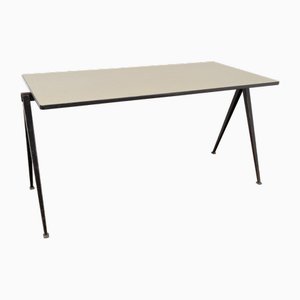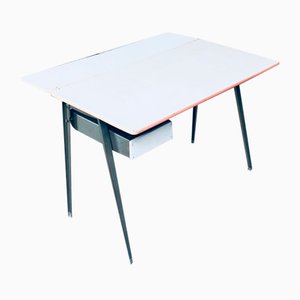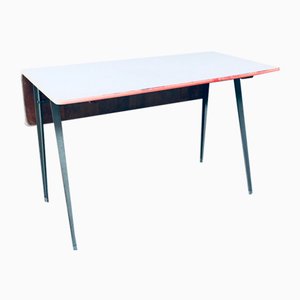
Youngest son of legendary Dutch architect-designer Gerrit Rietveld, Wim Rietveld was born in Utrecht in 1924. Though he initially apprenticed in a furniture factory in Utrecht, by 1950 he had enrolled at the Royal Academy of Art in The Hague to study design while also working in his father’s firm. Soon after, designer-entrepreneur Willem Hendrik Gispen took an interest in his work and invited him to produce designs for his company.
By 1953, Rietveld was head of design at Gispen, where he developed the award-winning Furniture for a Simple Interior collection, which included the iconic 1407 Chair (1953/54). Designed in collaboration with Dutch designer André Cordemeyer, the 1407 received the gold medal at the X Triennale di Milano in 1954 and achieved great popularity in the Netherlands for both domestic and office interiors well into the 1960s. Additional standout designs by Rietveld for Gispen include the Model 116 Chair (1953), Panama Lamp (1953), Model 663 Storage System (1954), and Mondial Chair (1958)—which was created for the Dutch Pavilion at the World Expo in Brussels in 1958.
In 1958, Rietveld left the Gispen and moved to Ahrend de Cirkel, where he began a fruitful collaboration with leading Dutch designer Friso Kramer. Together they produced a number of now-iconic designs, including the Results Chair (1958) and Reply Drafting Table (1958), the latter of which received the prestigious Signe d'Or prize in Brussels in 1963. Rietveld’s own Pyramid Tables and Chairs (1960) for Ahrend De Cirkel were also highly successful and remain sought-after on the vintage market today.
Famously, Rietveld defined his design ethos as “well shaped, solid, practical, and cheap.” This rationalist approach was in line with the needs of postwar Holland. In those years, Rietveld was an active member of the Goed Wonen foundation, which was dedicated to economic recovery and better living through good design. Throughout his career, Rietveld produced functionalist seating, tables, storage and shelving systems, and lighting that were spare yet homey, efficient yet eye-catching. Plywood and steel were his materials of choice. Beyond his prolific work for Gispen and Ahrend De Cirkel, Rietveld designed for other Dutch furniture manufacturers like Auping and Kembo, among others.
From 1960, Rietveld concentrated on transportation design, while lecturing at his alma mater, the Royal Academy, as well as the Technical University in Delft. Impressed by the diversity of his skills, the Technical University of Delft appointed him Extraordinary Professor in 1973. Rietveld’s creations can be found in many Dutch institutions, like the Stedelijk Museum Amsterdam. He passed away in 1985.



